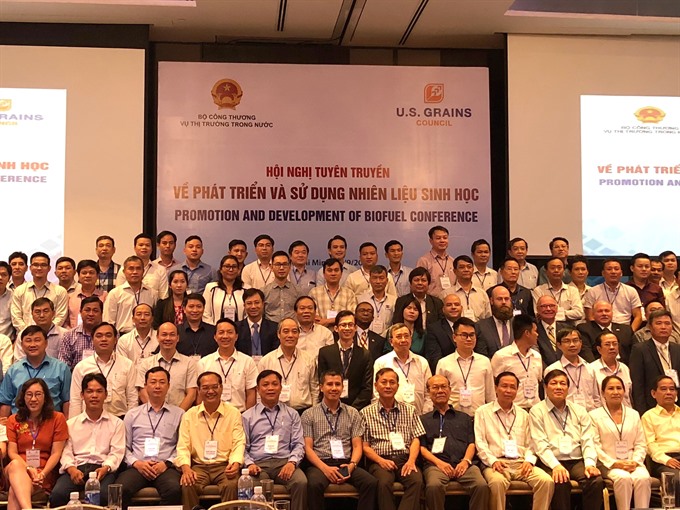 Economy
Economy

Consumption of bio-fuel E5 RON 92 topped 1.78 million cubic metres in the first half of the year, a year-on-year increase of 31 per cent and accounting for over 40 per cent of total petrol consumption, according to the Ministry of Industry and Trade.
 |
| Delegates pose for a photo at the Promotion and Development of Bio-fuel Conference held by the Ministry of Industry and Trade and the US Grains Council in HCM City on September 13. — VNS Photo |
HCM CITY — Consumption of bio-fuel E5 RON 92 topped 1.78 million cubic metres in the first half of the year, a year-on-year increase of 31 per cent and accounting for over 40 per cent of total petrol consumption, according to the Ministry of Industry and Trade.
Speaking at a conference on promoting biofuel use held by the ministry and the US Grains Council in HCM City on Thursday, Nguyễn Lộc An, deputy director general of the ministry’s domestic market department, said consumption of the bio-fuel has increased significantly since the country began mass commercial use of the fuel nation-wide this year.
Last year, consumption of E5 RON 92 accounted for just about 9 per cent of total petrol consumption, he said.
The fuel is a mixture of 95 per cent petrol and 5 per cent ethanol.
Lê Xuân Tình, deputy general director of PV Oil, said his company’s sales of E5 RON 92 in the first half of this year made up 50 per cent of its total fuel sales compared to 16-18 per cent last year.
Other oil trading companies such as Military Petroleum Corporation, Vietnam National Petroleum Group and Hải Linh Co,.Ltd have also reported higher sales of the bio-fuel.
“Many consumers have switched to bio-fuel due to the benefit to the environment, but owners of new-generation vehicles are still reluctant to use it,” Tình said.
Brian D. Healy, ethanol export market development manager at the US Grains Council, said more than 60 countries have bio-fuel policies in place.
In the last year 10 have announced significant expansions to these policies, he said.
He also spoke about factors driving the use of ethanol like the presence of agricultural producers and complementary industries, environmental and health benefits and economics and profitability.
Steve Walk, chief operation officer and director of business development at Protec Fuel Management, said more than 97 per cent of all petrol used in the US contains 10 per cent ethanol.
“E10 has been approved and used by motorcycles as a safe and cost saving alternative to straight gasoline for decades,” he said, adding “Retail stations are going to higher ethanol fuels like E15 and E85 fuel.”
A study on the impact of higher ethanol blend levels on vehicle emissions done by the US Grains Council and Dr Steffen Mueller, principal economist at the University of Illinois, in five cities (Beijing, Mexico, New Delhi, Seoul, and Tokyo) which have encountered air quality challenges, found that using E10 to replace fossil fuel reduces emission of pollutants by 15.2 per cent.
In Việt Nam, there have been studies in recent years on the use of bio-fuels by the Hanoi University of Technology and HCM City University of Technology, which found them to be safe, increase the efficiency of the engine and significantly reduce the emission of pollutants.
Lưu Quang Thái, chairman of the Việt Nam Biofuel Association, said “Many countries used 100 per cent bio-fuel and clearly they do not have an adverse impact on engines.”
The reason some Vietnamese consumers are still reluctant to use bio-fuel is psychological and more propaganda for the green fuel is needed, he said.
James Miller, president, Agriculture and Biofuel Policy Consulting, said Việt Nam has made tremendous progress in its ethanol programme.
“We need to do more in terms of educating the consumers so they fully understand that ethanol is a safe product that would be good not only for the engine but also for the environment.”
The next step for Việt Nam is to expand the use of ethanol and subsequently look to increase the blending rate from 5 per cent to 10 per cent, he said.
Tình said since there is only one company producing E100 alcohol in Việt Nam, an ingredient in the E5 mixture, there is not enough supply to produce bio-fuel.
Besides, the price of corn which is used in making ethanol, remains high, making the product less competitive and the Government should consider measures to bring down costs, he said.
Miller said the US government and industry stand ready to support Việt Nam in developing a policy. — VNS




